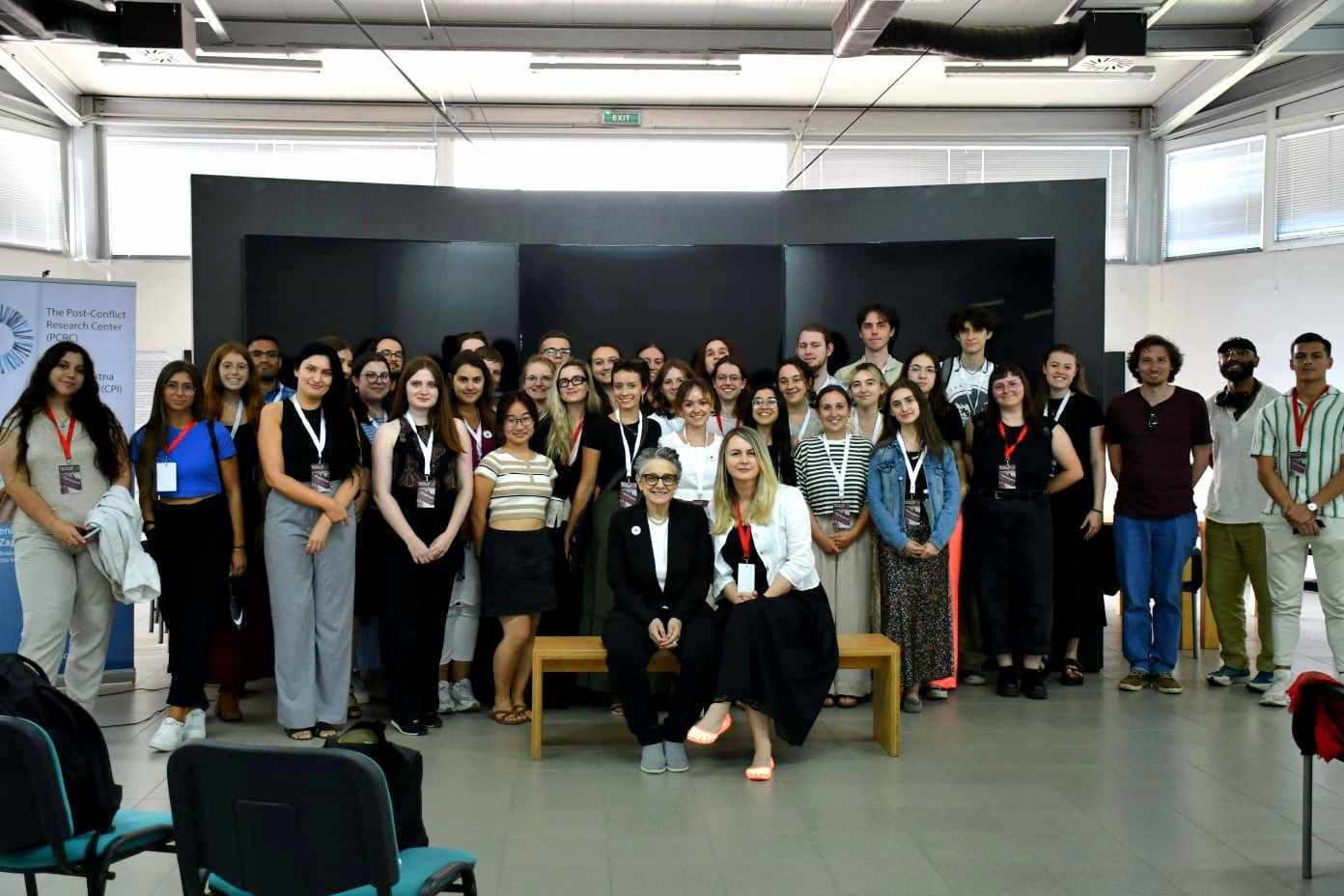
The fourth annual Srebrenica Youth School, organized by the Post-Conflict Research Center (PCRC) in collaboration with the Srebrenica Memorial Center, brought together 40 young people from Bosnia and Herzegovina, the Western Balkans, and around the world to explore topics such as transitional justice, memorialization, and historical narratives, as well as to honor the victims of the Srebrenica genocide.
The Srebrenica Youth School took place from July 7th to 14th. The participants were welcomed by Velma Šarić, President and Founder of PCRC, and Srebrenica Memorial Center Director Emir Suljagić, who spoke about the importance of studying and documenting the genocide.
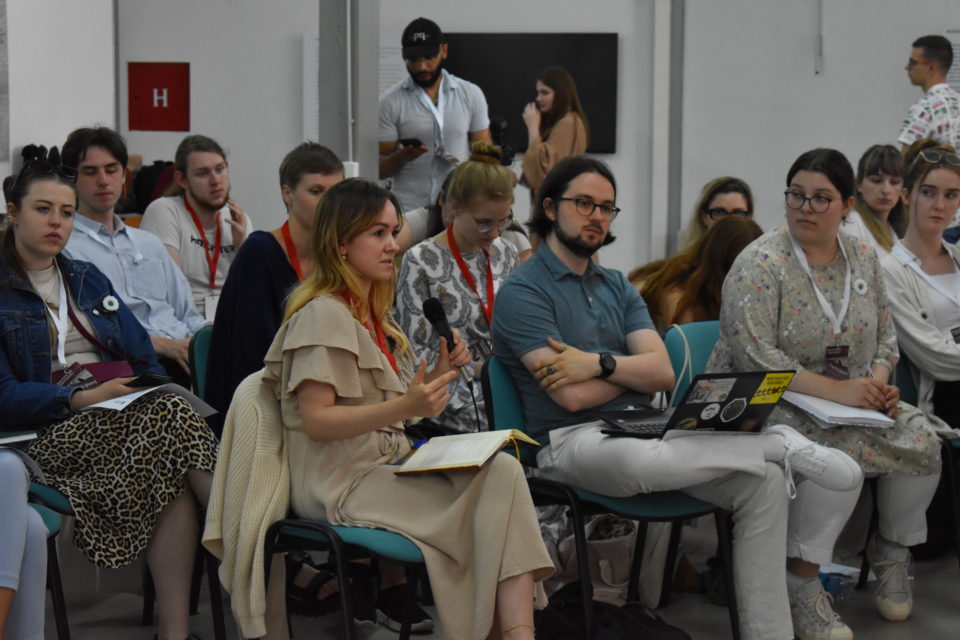
Participants in the Youth School had the opportunity to tour the Memorial Center, guided by Hasan Hasanović, the head of the Oral History Department. They discussed the importance of preserving the memory of the genocide through documentation as well as artistic mediums. On July 11th the participants also attended the collective funeral for the 30 genocide victims identified and buried this year.
Dino Abazović, a professor from the Faculty of Political Sciences at the University of Sarajevo, spoke about religion, identity, and ethnicity. He identified the interaction of these elements with not only the nation, but also with nationalism, as fundamental issues of the global order.
“We see what is happening in general, but in our region, it has its own historical and cultural foundation, so actually, this symbiosis of religious and ethnic identities has clearly been part of the problem forever. The majority of people have no problem saying that, even though we have a very high degree of religious self-identification, and we have expectations that in some better times this will be part of the solution,” said Abazović.
He explained that universal religious studies, especially of Christianity and Islam in our region, provide a framework for religion to finally be used for peacebuilding, rather than for division and potentially abuse, as we have witnessed since the 1990s.
Tanya L. Domi, a professor at Columbia University and the Hariman Institute in the Balkan Studies program, spoke about conflict-related sexual violence, noting that this practice continues today in places such as Ukraine and Ethiopia.
“There are 55 countries around the world that are currently in conflict, and we know from research that many of them are witnessing conflict-related sexual violence. The history of Bosnia and what happened between 1992 and 1995 is important for these participants to know because they are learning about Bosnia here. This is a part of the modern history of Bosnia,” explained Domi.
The school’s participants also had the opportunity to attend a lecture by Nihad Branković, Senior Government Relations Adviser from the International Commission for Missing Persons (ICMP), who explained the identification process that begins after the remains of missing persons are located.
The program also featured a discussion panel on local and international responses to genocide denial and hate-speech. Speakers on this panel included Fermin Cordoba, the Senior Political Advisor of the EU Delegation to Bosnia and Herzegovina, Halisa Skopljak, the OSCE Legal Advisor in Bosnia and Herzegovina, Agnes Picod, the Senior Advisor for Human Rights at the UN Office Resident Coordinator in Bosnia and Herzegovina, Ahmed Kulanić, the Director of the Sarajevo Canton Memorial Fund, and Ismar Porić, the General Manager of the Ensemble House and Emmaus Foundation.
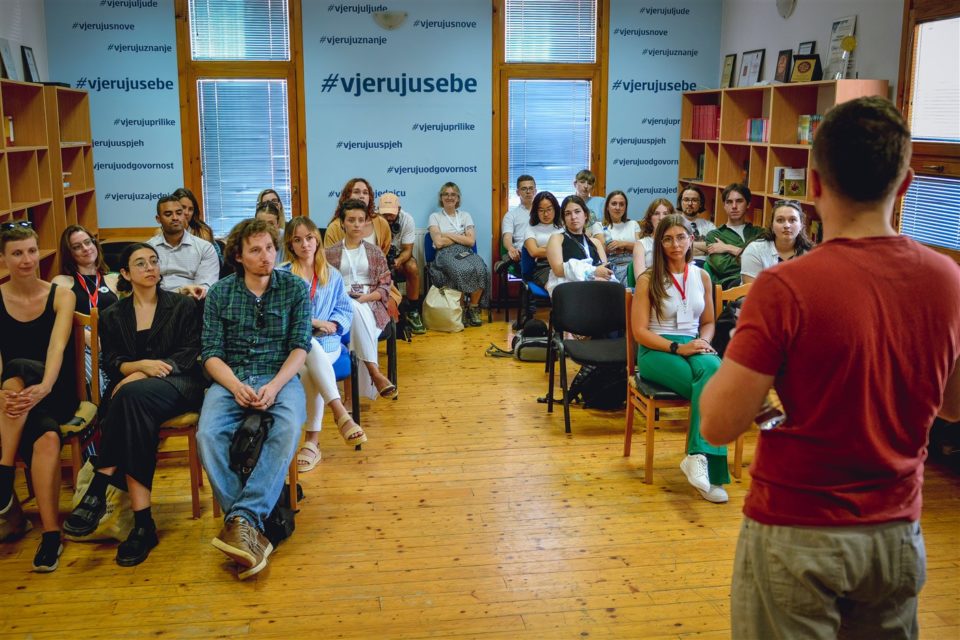
“On history teaching, more focus on multiperspectivity and empathy towards the ‘others’ is needed, as this can only result in more cohesive societies. Education should aim to contribute to mutual understanding and social healing, focusing on balancing the cognitive, the emotive and the ethical dimensions in history teaching and learning,” Fermin Cordoba stated.
On July 10th, summer school participants also had the opportunity to attend the Srebrenica Collective Memory Conference, jointly organized by the World Jewish Congress and the Srebrenica Memorial Center.
The Srebrenica Youth School was attended by young people from the USA, UK, Germany, Austria, the Netherlands, Italy, Japan, Lebanon, Lithuania, Montenegro, North Macedonia, Kosovo, and Switzerland, as well as numerous cities from Bosnia and Herzegovina.
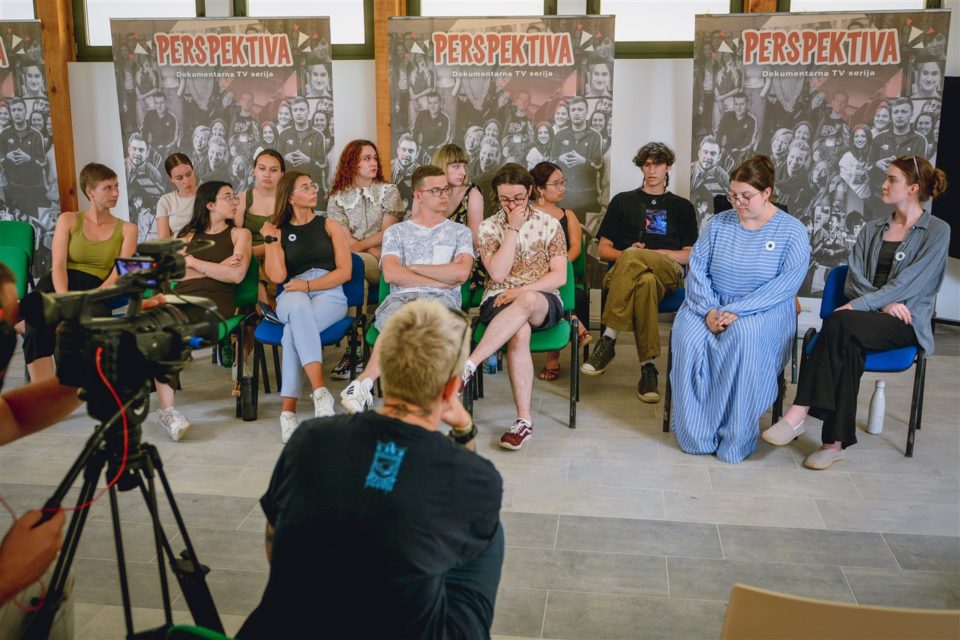
Amina Begić, one of the participants in the Srebrenica Youth School, highlighted the fact that the school not only provides a valuable educational opportunity, but also the opportunity to meet new people.
“I believe that these programs are very important, especially in Srebrenica. We need as many people from the Balkans as possible to come here, to talk more about the Srebrenica genocide and what happened here. We need to properly educate young people, because young people are the ones who will tell the story of Srebrenica,” said Begić.
During the school, the participants were also shown the documentary film “Uspomene 677,” co-produced by Pinch Media and PCRC. After the screening, they discussed the film with PCRC President Velma Šarić and PCRC Program Director Tatjana Milovanović.
Milovanović explained that the film’s goal is to depict the lives of young people in Bosnia and Herzegovina, which are inevitably shaped by the history of the war in their communities. For this reason, she emphasized that the PCRC’s work aims to show young people that all the identities we hold in life, such as religious and ethnic affiliations, can coexist harmoniously through friendship, love, and empathy.
The opportunity for participants to collaborate with the Subjective Atlas team on a cartographic representation of youth perspectives across their respective countries was a unique element of this year’s Srebrenica Youth School, which added a creative component to the program. The participant’s works will be an integral part of the Subjective Atlas of Bosnia and Herzegovina, which will be published next year in English and local languages. The atlas will be promoted not only in Bosnia and Herzegovina but also in other countries.
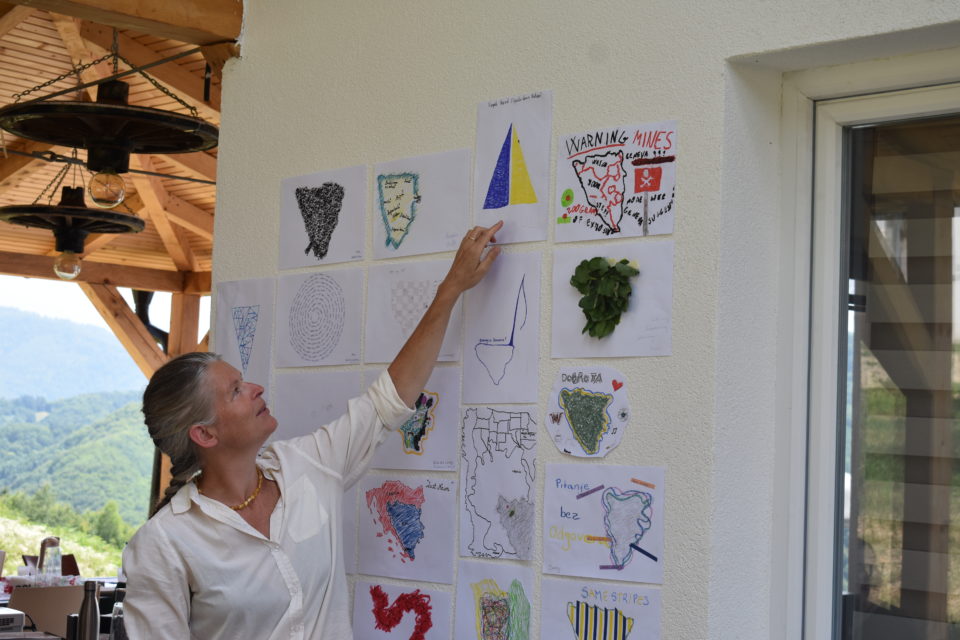
Annelys De Vet, the Founder and Editor-in-Chief of the Subjective Atlas, described the visual aspect of the participants’ works as far more important than the verbal aspect, as the former represents the “emotional insightful perspective” of the participants.
Explaining her decision to apply to attend the Srebrenica Youth School, Lamija Šarović stated, “I applied, first of all, because I thought that as a Bosnian, I need to learn more about these things, even at 18 years old.” When asked what about the program made the greatest impression on her, she replied that it was “being surrounded by people from different backgrounds. I was just very inspired and motivated by them in a way.”
School participants had the opportunity to acquaint themselves with the local environment of Srebrenica, and some of elected to join in the Peace March for the last several kilometers before Potočari.
Throughout the duration of the school, the participants were accommodated at the Ensemble House and Emmaus Foundation premises. They also had the chance to visit the House of Good Tones, a local organization dedicated to providing children and young people in Srebrenica access to quality educational, cultural, and entertainment resources.
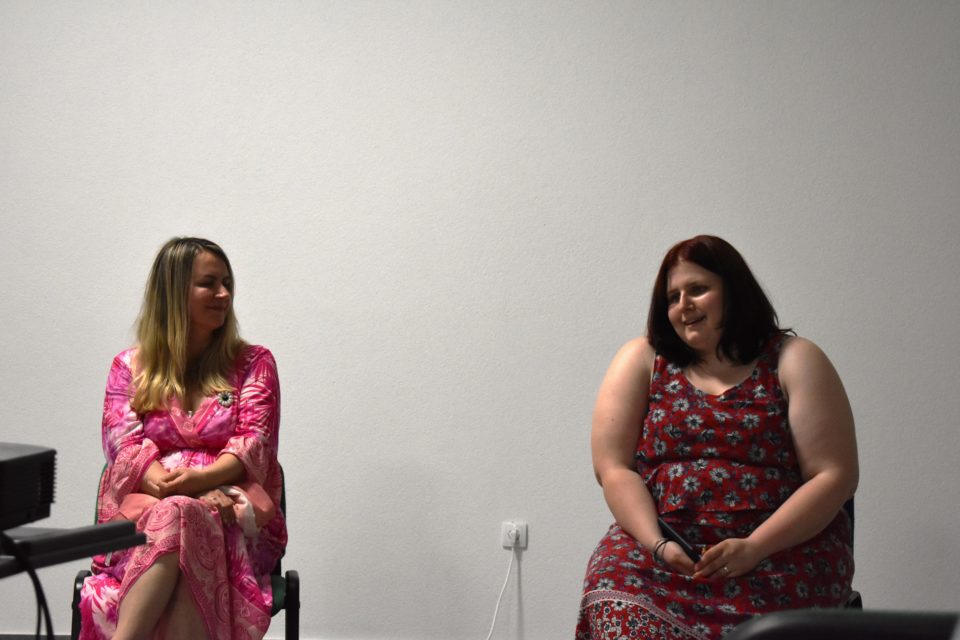
Juan Ortiz, a participant from the United States, described the outdoor aspect of the accommodation as very refreshing. “I enjoyed a lot the enormous professional value of the school. I think I was very humble to my friends back home and my community because this feels like national, study major. It was really nice to meet so many nice people at the same level of career.”
The Srebrenica Youth School concluded with the filming of the TV series “Perspective,” hosted by Ada Sokolović and Marcelo, a rapper, novelist, and columnist from Serbia. The program, which deals with the problems young people face in society, has been broadcast for nine years in the region, thanks to the production team from Mebius Film.
This year’s Srebrenica Youth School was made possible with the support of the National Endowment for Democracy, the Sigrid Rausing Trust, the Rockefeller Brothers Fund, and the OSCE Mission to Bosnia and Herzegovina.





